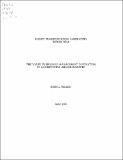| dc.contributor.author | Wilson, John L. | en_US |
| dc.contributor.other | Massachusetts Institute of Technology. Flight Transportation Laboratory | en_US |
| dc.date.accessioned | 2012-01-06T22:29:38Z | |
| dc.date.available | 2012-01-06T22:29:38Z | |
| dc.date.issued | 1995 | en_US |
| dc.identifier | 38210168 | en_US |
| dc.identifier.uri | http://hdl.handle.net/1721.1/68134 | |
| dc.description | May 1995 | en_US |
| dc.description | Includes bibliographical references (p. 129-130) | en_US |
| dc.description.abstract | The value of revenue management to the airlines has been amply demonstrated, both by industry experience and in simulation studies of the reservation process. However, there have been no attempts to determine if the benefits of seat inventory control are specific to the competitive market setting in which it is instituted. Furthermore, previous theoretical research has not considered whether interactions of the control methods of rival carriers may affect both the total revenue improvement attainable in the market and how these gains are shared by individual carriers. This thesis uses a modeling approach created by the Boeing Commercial Airplane Group to address these questions. The Passenger Origin / Destination Simulator combines a demand model framework with a set of routines which implement the basic forecasting and inventory control functions of airline revenue management. The Boeing simulation system is implemented in the thesis through the development of a generic fare product structure, passenger behavioral attributes, and assumptions on demand composition. Within this Operational Competitive Simulation Environment, the effect of competition on the value of revenue management is explored in simulation experiments with three classes of scenarios. In these scenarios, the gains from leg-based inventory control are assessed under varying competitive conditions, including the magnitude and distribution of passenger demand, carrier frequency share, relative departure timing, and route network design. From the simulation results, it is apparent first that inventory control innovation always improves carrier and aggregate market revenues-competition along the dimension of revenue management is not a zero-sum game from the carriers' perspective. A signal contribution of the experimental research has been the finding that the revenue dividend from inventory control derives largely from the sale of higher-yield fare products to leisure and discretionary business passengers, and only marginally at the expense of those carriers with a less advanced control capability. Additionally, the relative changes in revenue due to different control methods are indeed influenced by other competitive forces operative in the market. | en_US |
| dc.format.extent | 130 p | en_US |
| dc.publisher | Cambridge, MA : [Massachusetts Institute of Technology], Flight Transportation Laboratory, [1995] | en_US |
| dc.relation.ispartofseries | FTL report (Massachusetts Institute of Technology. Flight Transportation Laboratory) ; R95-8 | en_US |
| dc.subject | Airlines | en_US |
| dc.subject | Revenue management | en_US |
| dc.subject | Airlines | en_US |
| dc.subject | Management | en_US |
| dc.title | The value of revenue management innovation in a competitive airline industry | en_US |
| dc.type | Technical Report | en_US |
